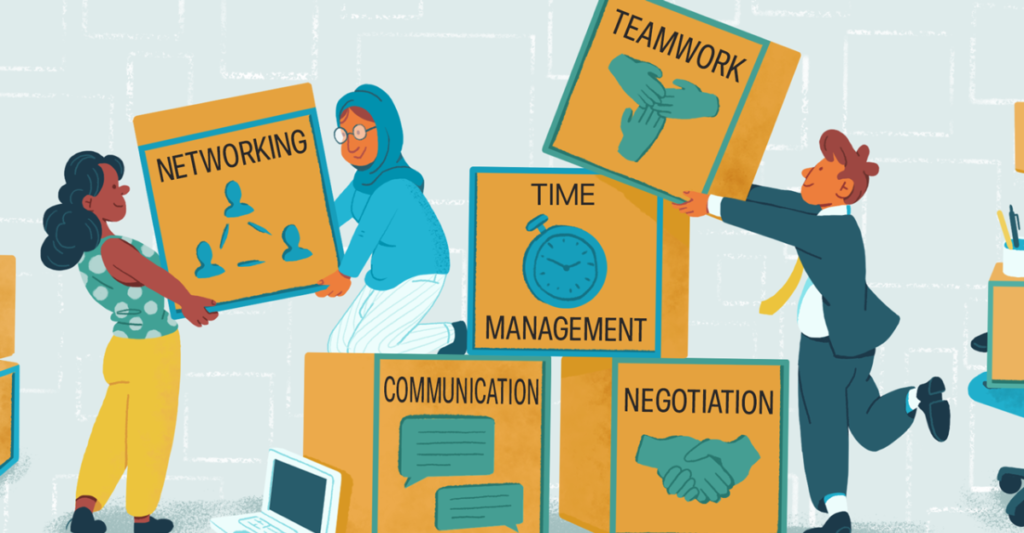Future-Proof Your Career: Key Skills and Trends for Professional Growth
- 126 Views
- Rupali
- May 21, 2024
- Blog Career and Education Career Development Advice
Understanding the Evolving Workforce Landscape
As the workplace landscape is continuously changing according to technological advancements, shifting demographics, and changing economic dynamics. It’s important for us to understand the key trends shaping the future of work.
One of the most significant shifts is the rise of automation and artificial intelligence, which is upgrading the way we approach various job functions. Certain tasks are becoming increasingly automated, while new roles emerge that require specialized skills in areas such as data analysis, digital marketing, and cybersecurity.
Alongside technological changes, the workforce is also becoming more diverse and flexible. The traditional 9-to-5 office model is giving way to remote work, gig employment, and hybrid arrangements, as employers seek to attract and retain top talent. This shift requires employees to develop adaptability and self-management skills to thrive in this evolving landscape.
Furthermore, the job market is experiencing significant volatility, with some industries experiencing growth while others face disruption. You need to understand these trends and align your career planning accordingly. This can help you stay ahead of the curve and capitalize on emerging opportunities.
By staying up-to-date about the evolving workforce landscape, individuals can make more informed decisions about their career paths, upskilling, and professional development. This knowledge can empower you to navigate the changing job market with confidence and position yourself for long-term success.
Top 5 In-Demand Skills for the Future
The job market is constantly evolving, and to stay competitive, it’s crucial to develop skills that will be in high demand in the years to come. Here are the top 5 in-demand skills for the future:
1. Adaptability and Lifelong Learning
2. Critical Thinking and Problem-Solving
3. Emotional Intelligence
4. Digital Literacy
5. Interdisciplinary Expertise
By developing these in-demand skills, you can future-proof your career and position yourself for success in the years to come.
Upskilling and Reskilling: Strategies for Continuous Learning

In today’s dynamic job market, it is important for individuals to have the ability to continuously learn and adapt new skills for their future growth. Upskilling and reskilling have become essential strategies for individuals seeking to stay relevant and competitive in their careers.
Upskilling refers to the process of learning new skills or improving existing ones to improve job performance . This could involve taking online courses, attending workshops, or seeking out mentorship opportunities. On the other hand, Reskilling involves learning entirely new skills to transition into a different career path.
Both upskilling and reskilling require a commitment to lifelong learning. Professionals who adopt a mindset of continuous skill-building are better equipped to navigate the changing landscape of the workforce and capitalize on emerging opportunities. Employers, too, are increasingly recognizing the value of supporting their workforce’s professional development through reskilling programs and learning resources.
By proactively investing in their own skill-building, individuals can future-proof their careers and position themselves for long-term success. Whether it’s mastering the latest software, developing leadership abilities, or exploring a new industry, the rewards of upskilling and reskilling can be substantial, both for personal growth and organizational impact.
Adapting to Emerging Technologies and Digital Transformation
As technology continues to evolve at a rapid pace, it is essential for individuals and organizations to stay ahead of the curve and adapt to emerging trends. The rise of automation, artificial intelligence, and robotics is transforming the way we work, live, and interact with the world around us.
To thrive in this digital age, it is crucial to develop a tech-savvy workforce that is equipped with the necessary digital skills. This includes proficiency in using various software, platforms, and tools, as well as the ability to understand and utilize cutting-edge technologies to promote efficiency and creativity.
Organizations that adopt digital transformation and invest in upskilling their employees will be better positioned to navigate the challenges and capitalize on the opportunities presented by the changing technological landscape. By following a culture of continuous learning and adaptation, businesses can ensure that their workforce remains agile, adaptable, and ready to tackle the demands of the future.
Cultivating Soft Skills for Long-Term Career Resilience

Building a strong foundation of soft skills is essential for sustaining long-term career resilience in the quickly changing work market of today. Technical proficiency is still necessary, but collaboration, communication, and adaptability skills are becoming more and more in-demand.
Transferable skills such as problem-solving, critical thinking, and emotional intelligence are highly sought-after by employers across industries. These “soft” capabilities enable professionals to navigate complex challenges, work well with diverse teams, and demonstrate agility in the face of change.
Cultivating soft skills not only enhances one’s current job performance but also prepares individuals for future career transitions. By honing interpersonal abilities and a growth mindset, workers can future-proof their skillsets and remain adaptable in an ever-changing job landscape.
Investing time in developing soft skills through training, mentorship, and practical experience can pay dividends in the long run. Professionals who prioritize these transferable competencies are better equipped to weather economic shifts, technological disruptions, and other industry fluctuations.
How can you help yourself to pursue your future career
Pursuing a future career can be an exciting yet daunting prospect. However, there are steps you can take to help yourself along the way.
First, it’s important to engage in self-reflection and identify your passions, skills, and values. What activities energize you and bring you a sense of purpose? What natural talents do you possess that you could leverage in a career? Answering these questions can provide clarity on the types of roles and industries that may be a good fit.
Next, research potential career paths that align with your interests and abilities. Explore job descriptions, educational requirements, and growth trajectories to get a sense of what different options entail. Informational interviews with professionals in your fields of interest can also offer invaluable insights.
Building relevant experience through internships, volunteer work, or entry-level positions is another crucial step. These opportunities allow you to gain practical skills, make connections, and test out potential career paths. Don’t be afraid to start small and work your way up.
Finally, take proactive steps to develop the qualifications needed for your desired career. This may involve pursuing additional education, obtaining certifications, or honing specific skills. Staying curious and continuously learning will serve you well as you navigate the ever-evolving job market.
By engaging in self-discovery, research, and skill-building, you can take meaningful strides towards shaping a fulfilling future career.
Conclusion: Take Charge of Your Professional Future Today
As we’ve explored, the future of work is rapidly evolving, driven by technological advancements and shifting market demands. To future-proof your career, it’s essential to take a proactive approach to professional development and workforce preparation.
By assessing your skills, identifying areas for growth, and continuously upskilling, you can position yourself for long-term success. Adopt lifelong learning, stay adaptable, and be open to new opportunities that align with your career aspirations.
Remember, the power to shape your professional future lies in your hands. Take charge today and invest in your own growth and development. With the right mindset and strategic actions, you can navigate the changing landscape of work and thrive in the years to come.
Categories
- Blog
- Career and Education
- Career Development Advice
- DIY Projects
- Fashion and Beauty
- Fashion Trends
- Food and Cooking
- Food Trends
- Health and Wellness
- Home and Decor
- Home Organization Tips
- Interior Design Ideas
- Lifestyle
- Personal Development
- Productivity Tips
- Recipes and Cooking Tips
- Restaurant Reviews
- Self-Care and Mental Health
- Skincare and Beauty Tips
- Tech News and Trends
- Technology
- Travel
- Travel Tips and Hacks
Popular Tags
5 areas of personal development 5 benefits of self-care 5 ways to increase productivity 2024 fashion trends streetwear 2024 fashion trends woman Career career development plan cooking skills Daily skin care routine at home Digital Trends fashion trend forecast 2024 vogue Fashion trends 2024 fashion trends 2024 spring/summer fashion trends for women Food Trends Health and Wellness Healthy skin tips for face Home Organization Hacks https://wefocuseducom.com/ inexpensive home organization ideas Interior design ideas living room latest information technology trends Latest trends in fashion for ladies Lifestyle Lifestyle for Wellness list of careers in education mental health mental health awareness personal development examples positive mindset positive restaurant reviews (examples) practicing mindfulness productivity tips Self-Care Self-Care and Mental Health self-care tips for mental health spring/summer 2024 fashion trends women's technology time management skills Top 10 tips to maintain your mental health top new technologies Tried-and-Tested Recipes what are 5 careers in education what are the 3 aspects of personal development? What is self-care

